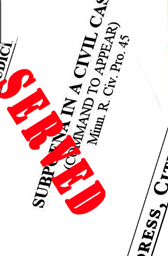Just the facts please . . .
So, did you called your attorney? No, not yet? But you will? Okay. I guess, I’ll answer a few questions for you first. But only about what your attorney will need from you when you call? You need to speak to your own attorney and not just read this on some stupid blog written by someone you never met and do not even know is a real attorney. I’ll be using a lot of usuallys, generallys and ordinarilys and not many specificallys, totallys or exclusivelys.
Continuing with my last post, most attorneys will usually want details about the Subpoena when you call. When were you served? How were you served? Who is it from? What are you asked to produce? Did you know this case is going on? Do you know these people? Do you know anything about this? What court has this case? Why do they want your records? How are your records related? What did you do here? Are you sure?
 . . . and the documents too.
. . . and the documents too.
Ordinarily, an attorney will want to see a copy of the actual Subpoena itself along with any documents that came with it or were attached to it. There are a number of technical requirements that the Subpoena needs to comply with on it’s face, that must be included with it and how it must be delivered for it to be valid and enforceable. Plus, your attorney will want to know who served it, the parties’ names as listed in the caption and who their attorneys are, where and how the production is taking place, if it is in federal or state court, the specific language used to describe what you are supposed to produce and other things. Since most of this information comes on or with the Subpoena, I always want to see a all of it as soon as possible.
Under What Authority?
Rule 45 of the Federal and Minnesota Rules of Civil Procedure govern Subpoenas in civil lawsuits. Minn.R.Civ.P. 45.01 (2014); Fed.R.Civ.P. 45 (2014). Although already alike, after Minnesota amended its state court version of Rule 45 in 2006 the state rule is now almost a mirror image of the Federal version of Rule 45. They are similar enough to make some general observations that usually are applicable to both Rules.
Subpoena Power
The generalities begin with an attorney being an officer of the court in both forums. As such, an attorney has “Subpoena power” and usually does not need any separate authorization by a judge to use and serve a Subpoena. This power is used to compel people and businesses to provide information needed and related to a lawsuit, whether it is testimony, documentary or in some other tangible form. If you fail or refuse to comply with any type of Subpoena, a court can find you in contempt of court and impose typical contempt sanctions (fines and time in jail to obtain your compliance).
Subpoena Duces Tecum
The type of Subpoena in the post below is formally called a Subpoena Duces Tecum (meaning bring it with you or be penalized in Latin). It requires you to provide documents or other physical items, including electronic data created by and stored on a computer’s hard drive or in its memory.
In Minnesota, a Subpoena Duces Tecum usually does not involve providing testimony, but it can. You have to be certain so it is best not to rely on any ambiguous cover letters that were served with it. You need to read and comply with the actual wording in the Subpoena itself.
 Particulars
Particulars
Based on the circumstances described in my previous post, a number of things happened with this Subpoena that should be considered.
1. Properly Served?
The first question that always should be asked is if service of the Subpoena was proper. A Subpoena under Rule 45 has to be personally served to be effective. To be proper, there are service specifics as to who may serve the Subpoena, where and when it may be served, who it has to be served on and how it is to be served, among other requirements. Make sure your attorney knows how you got the Subpoena.
2. Right Person?
This Subpoena requires records be produced that belong to the company. As long as your business is a corporation or LLC, the Subpoena should not name a specific person and will usually name the “Records Custodian/Custodian of Records.” This usually means whoever has access to the business’s records, is responsible for maintaining them and can certify to the court (and everyone else) the records produced are what was asked for and have not been improperly altered.
3. Witness Fees?
The attorney that served the Subpoena has to include a witness fee of $20.00 per day in Minnesota state court cases and $40.00 for federal cases. If this is not included with the Subpoena when served, the Subpoena may be considered invalid. Besides the generous per diem witness fee, the party serving the Subpoena is required to reimburse you for round trip mileage (28 cents and 55.5 cents respectively in state and federal cases) to the scheduled event (trial or deposition) from your home or workplace.
4. Compensation?
If you are not a voluntary participant in the case (or employed by one) and it involves your business or profession, you are to be compensated for your time complying with a Subpoena Duces Tecum. If the Subpoena fails to address compensation your attorney can object or bring a motion, depending on the circumstances, burden and costs involved. Arrangements to reasonably compensate you for the time required to comply with it should be addressed before compliance. However, being required to respond to a single Subpoena Duces Tecum personally and incurring nominal expenses is not presumed to be compensable under the Rule. It’s like serving as a juror to a degree: a civic duty. Protecting people who have nothing to do with the case from unreasonable burdens is preferred but not required.
5. Timing?
Rule 45 requires reasonable notice. But the rule does not set a specific time limit. Typically, ten days is enough, but why is reasonable may be shorter or longer depending on the circumstances of the case. A potential trap for the unwary is that a non-party has up to 14 days to object to the Subpoena. Because any objections must be asserted before the time set for compliance under the Subpoena, you cannot hope to take advantage of the full 14 days if the Subpoena requires a shorter time to comply. It is a good idea to assert any objections as soon as they can be determined and not wait until the last minute, or worse, think you have 14 days as stated in the Rule if the testimony or documents requested are due sooner.
6. Reasons to Object or Quash?
Subpoenas Duces Tecum may be opposed on grounds of privilege, undue burden, relevance, reasonableness, oppression and for other good cause. But keep in mind the court alone makes the final determination as to what constitutes any of these factors and what weight each one is to be given. Just like beauty is in the eye of the beholder, one person’s relevance may be extraneous to another. As a result, you should always proceed with an abundance of caution and try to comply (and document your efforts). After all, when contempt penalties are possible it is always better to be safe rather than sorry.
Conclusion
 Although Rule 45 does provide some protections to non-parties, few are required and strict compliance will always be expected. The best way to deal with the unfortunate burden of being served with a Subpoena Duces Tecum is to act promptly and thoroughly with the guidance of an attorney. After all, there may come a day when you need to obtain information for a lawsuit and serving a Subpoena Duces Tecum on an unrelated third party may be the only way to obtain it.
Although Rule 45 does provide some protections to non-parties, few are required and strict compliance will always be expected. The best way to deal with the unfortunate burden of being served with a Subpoena Duces Tecum is to act promptly and thoroughly with the guidance of an attorney. After all, there may come a day when you need to obtain information for a lawsuit and serving a Subpoena Duces Tecum on an unrelated third party may be the only way to obtain it.
Now will you call your attorney?
Next up: Conclusion: The Confidentiality Issues . . .



